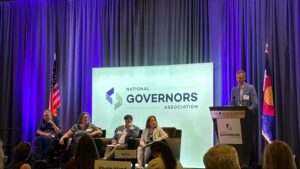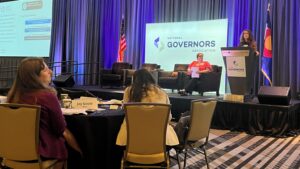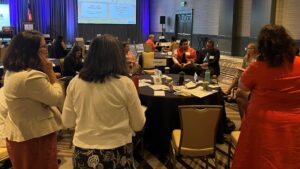The 2023 National Governors Association Healthcare Workforce Summit was held in Broomfield, Colorado, August 21-23, 2023. The summit brought together leaders from 18 states and territories that are part of the National Governors Association Center for Best Practices (NGA Center) healthcare workforce project. The three-day summit was filled with peer-to-peer learning, presentations from healthcare workforce experts, and opportunities for inter-state dialogue and goal setting.

The summit concluded the NGA Center’s second year of convening this project – a year that has seen the project grow from a small cohort to a large and expansive network. During the second year of the project, the NGA Center convened a series of webinars and added new tools and resources to the newly released Healthcare Workforce Toolkit. Additionally, the NGA Center convened three regional workshops for eastern, central, and western states and territories during the summer of 2023. This summit served as a bookend for the second year of programming, leading into a third year where the NGA Center hopes to add more states and territories to this growing network.
Participating state and territory teams that were appointed by their Governors included Alabama, American Samoa, California, Colorado, Connecticut, Illinois, Maine, Michigan, Minnesota, Missouri, Ohio, Oklahoma, Oregon, Rhode Island, South Carolina, Utah, Wisconsin, and Wyoming. Additionally, the summit was widely attended by NGA partners and experts in the field.
The first day kicked off with a session for states and territories to meet one-on-one with other project teams to discuss barriers, goals, and the progress they’ve made in meeting the needs of their state or territory’s healthcare workforce. Following this framing, Dr. Hannah Maxey, the NGA Center’s consultant from Veritas Health Solutions, led a session introducing the state and territory profiles that were prepared for each team to help them understand the available data and metrics across the healthcare sector. The first day wrapped up with a session featuring Van Ton-Quinlivan, who shared insights on FuturoHealth’s healthcare career pathways work as a resource for possible healthcare workforce education training.
The second day began with remarks from Colorado Governor and NGA Vice Chair Jared Polis, welcoming participants to Colorado. Governor Polis highlighted investments made by Colorado to support the healthcare workforce through programs such as Care Forward Colorado, an initiative to provide free training for certifications in high need occupations including certified nursing assistants, emergency medical technicians, dental assistants, phlebotomy technicians, and others.

Captain Alicia Souvignier from the Health Resources and Services Administration (HRSA), the project funder, was next to provide remarks. Captain Souvignier highlighted healthcare workforce supports and resources available to states and territories through regional offices. Next up was Dr. Ivy Bourgeault, a Professor in the School of Sociological and Anthropological Studies at the University of Ottawa, who provided an overview of the healthcare workforce in the context of the global economy and a perspective on the Canadian Health Workforce Network including shared challenges and case solutions between Cananda and the United States on matters of healthcare workforce. The next session focused on innovations to support the direct care workforce — a topic that has been top of mind for project states over the past two years. Dr. Alice Bonner talked about resources available through the Moving Forward Nursing Home Quality Coalition (NHQC), and Dr. Abby Stivers, the Director of Workforce Initiatives for the Office of Aging and Disability at the Maine Department of Health and Human Services, highlighted Maine’s investments in home and community-based services (HCBS). After a morning of engaging content, state and territory participants reconvened with their regional groups to continue critical conversations that began during the regional workshops.
After an engaging working lunch, Colorado Lieutenant Governor Dianne Primavera led a session on the intersections of aging and disability on healthcare workforce needs, highlighting Colorado’s critical investments to support these vulnerable populations. Lieutenant Governor Primavera moderated the session with members of her staff and shared information about Colorado’s plan to support the healthcare workforce through the lenses of age and disability. Elisabeth Arenales, Deputy Director of the Colorado Office of Saving People Money on Healthcare, shared information on several of the state’s health initiatives; Josh Winkler, Disability Policy Advisor, discussed disability initiatives such as the Committee for People with Co-occurring Disabilities; and Jarett Hughes, Deputy Director of Policy and Research, presented on aging demographics and related state programs. Participants then engaged in a peer-to-peer learning session, with panelists from Colorado, Oregon, and Rhode Island sharing ways to align behavioral health workforce priorities. The session drew from Lieutenant Governor Primavera’s panel and talked about specific behavioral health barriers for an aging healthcare workforce. To wrap up the second full day of the summit, Dr. Hannah Maxey moderated a session with Colorado and Utah on cross-profession healthcare workforce data. Dr. Maxey presented on the Cross-Profession Minimum Data Set, a new tool with a set of core questions for collecting data elements for health workforce planning designed to standardize the data collected across states and health professions.

The third and final day of the summit offered participants opportunities to focus more specifically on policy areas to support the healthcare workforce. The day began with two rounds of breakout sessions, each listed below:
Breakout Session I
- Utilizing Alternative Pathways to Address Long-Term Care Staffing Shortages: Participants heard from Laura Ward, Senior Director of Workforce Solutions at Merit, and Eleni Papadakis, Executive Director of the Washington Workforce Training and Education Coordinating Board, on innovative ways to support the long-term care workforce.
- Engaging and Leveraging Innovative State, Local, and Tribal Partners: Holly McKamey Simoni, Workforce Programs Administrator at the Wyoming Department of Workforce Services, and Dr. Jen Davis, Senior Policy Advisor at the office of Governor Mark Gordon, spoke alongside Jenifer Lewis, Interagency Tribal Liaison at the Colorado Commission of Indian Affairs within the office of Lieutenant Governor Dianne Primavera. Each team highlighted their work engaging tourism boards, local philanthropies, and tribal partners to support the healthcare workforce.
- Lessons Learned from Missouri’s Workforce Engagement Model: The Missouri healthcare workforce project team lead by Paula Nickelson, Director of the Missouri Department of Health and Senior Services, broke down their workforce engagement model, including ways the Department of Health and Senior Services, Department of Higher Education and Workforce Development, Department of Mental Health, and Missouri Hospital Association are staying aligned on recruitment and retention strategies. The project team includes Yvonne Wright, Deputy Director of the Missouri Office of Workforce Development; Jill Williams, Vice President of Workforce Development at the Missouri Hospital Association; and Kerri Tesreau, Assistant Director at the Missouri Department of Mental Health.
Breakout Session II:
- State Innovations Related to the Nursing Workforce: Peggy Benson, the Executive Officer of the Alabama Board of Nursing, highlighted innovations to support the nursing workforce, a topic that is top of mind for project states and territories.
- Wellness and Resilience for Healthcare Workers: Dr. Curt Drennen, Branch Chief at the Disaster Behavioral Health and Community Recovery office in the Colorado Department of Human Services, and Michael Neustedter, Partnerships and Recruitment Director at First Descents, shared their innovative work to promote wellness and resilience for the healthcare workforce.
- Energy Resilience and Infrastructure: Ophelia Usher, Expert Associate Partner for McKinsey & Company, and Eric Cote, Project Director from Powered for Patients, led a follow-up conversation to a December 2022 roundtable that focused specifically on energy infrastructure and the intersections between emergency preparedness and a robust healthcare workforce.
After the two breakout sessions, state and territory participants had the opportunity to meet with their teams and discuss key takeaways from the summit with Dr. Hannah Maxey. This session focused on strategic planning with a goal to move from ideation to action when planning for growing the healthcare workforce in each state and territory. Concluding the final day, Dr. Shelby Hockenberry wrapped up the summit with an eye toward energizing states and territories for the next year of work for the project.
During three full days of programming, participants had the opportunity to hear from national and international experts, state and territorial leaders, and engage in peer-to-peer learning. The summit was successful largely because of the engagement and participation from the network states and territories.
For information on recent outcomes from the Next Generation of the Healthcare Workforce project, please see the recent report, Preparing the Next Generation of the Healthcare Workforce: State Strategies for Recruitment and Retention, the State Health Workforce Toolkit, or contact Anna Heard (AHeard@nga.org) for more information on how your state or territory can become a member of this growing network.












